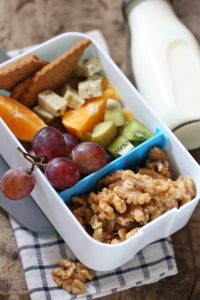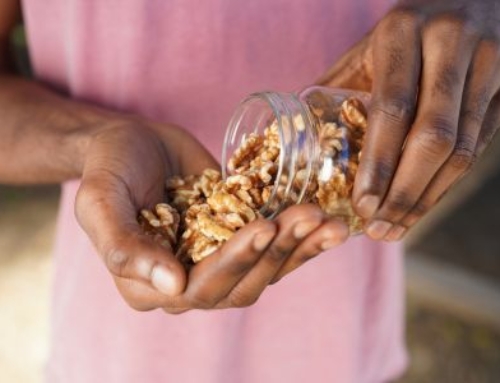Snacking Whilst Working From Home
With more of us working from home at the moment, we asked our consultant dietitian Sian Porter to share some tips on how to manage the call of the kitchen cupboards …
At the moment everyone has been asked to work from home if they possibly can.  Welcome though it may be to some, this situation brings both challenges, such as finding a quiet space to work and isolation, as well as rewards, such as not having to battle through the daily commute.
Welcome though it may be to some, this situation brings both challenges, such as finding a quiet space to work and isolation, as well as rewards, such as not having to battle through the daily commute.
Something people may struggle with is the fact they have access to their kitchen and the contents of their cupboards and fridge at all times. The novelty of this situation, coupled with boredom or anxiety, can lead to mindless eating, constant grazing and over eating. It can also create tension in the household over who ate the last biscuit and is arriving at the dinner table not hungry, eating for the sake of it and wasting food. The American journalist Michael Pollan said ‘If you are not hungry enough to eat an apple, you are not really hungry’ so use the following tips to distinguish between hunger, craving, boredom and emotional eating.
- Try and keep to your normal work day pattern of how often you eat and how much you eat. Stick to the same amounts and routine.
- Have set meal times (and snack times if needed) and stick to them.
- If it’s not in the house you cannot eat it so limit buying foods such as biscuits, crisps, sweets.
- Choose satisfying snacks with fibre and protein such as nuts, a tablespoon of hummus and carrot, yogurt and fruit. A handful of walnuts provides 4.4g of protein and 1.4g of fibre.
- Have healthy snacks such as veg sticks (cucumber, peppers, celery, carrots) chopped up ready in the fridge, fruit (but stick to a portion), a handful of nuts such as walnuts, and seeds available.
- Ask yourself is it genuine hunger or head hunger because you’re bored/ seen the food/ using food as a pick me up?
- Avoid using food as the solution or as a reward. Think what you can do instead such as phoning a colleague or friend, going outside or having a tidy.
- Keep hydrated. Keep water in line of sight on your ‘desk’ and top up regularly.
- Limit caffeinated drinks to your usual amounts, suggested limit is 3-5 per day (follow guidelines if pregnant) and choose water, herbal or fruit teas as alternatives.
- Keep moving. Get up regularly from your ‘desk’ to stretch and move, getting outside every day within government guidelines and doing some form of exercise.
- Eat enough to feel satisfied – not stuffed or hungry, but not over hungry for your meals.
- Look after your teeth – constant snacking can lead to tooth decay.
- Getting enough sleep is important for coping with stress and anxiety. Prolonged lack of sleep can negatively affect your immune system[1]. Lack of sleep is linked with overeating and overeating in turn can affect your sleep (for example indigestion), so try to avoid eating too close to bedtime and manage amounts.
Walnuts are an ideal snack or part of a meal. A portion is a handful which is approximately 12-14 halves. Have a look at our huge variety of recipes for inspiration. Once bought, walnuts are best kept in the fridge (for six months), or freezer (for 12 months), for freshness and taste.
If you feel out of control or your feelings affect your daily activities over a few days, seek help. Talk with people you trust about your concerns and how you are feeling. Seek help from a health professional or relevant charity if needed.
[1] https://www.nhs.uk/live-well/sleep-and-tiredness/why-lack-of-sleep-is-bad-for-your-health/





